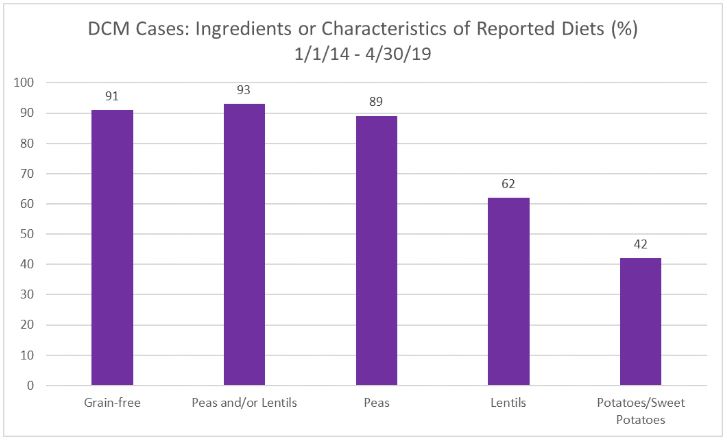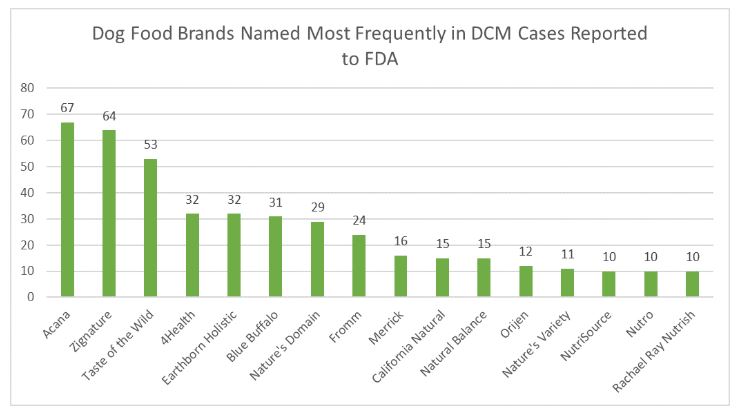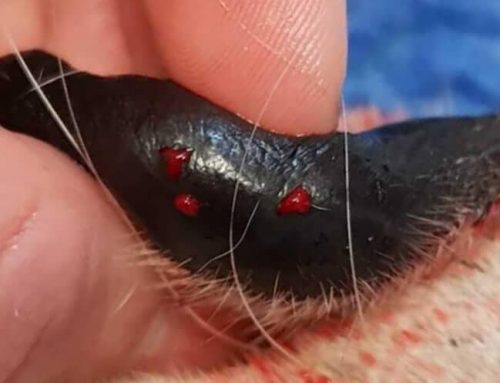Grain-Free & BEG Diets Causing Taurine Related Dilated Cardiomyopathy
Globally, dogs are dying or becoming very ill from a canine heart disease that is known as taurine-deficient dilated cardiomyopathy.
Whilst the exact mechanism is still unknown, current research suggests that it isn’t just a taurine deficiency that is at play in these commercial diets from boutique companies that contain exotic ingredients or are grain-free (BEG diets).
Many of these grain-free BEG diets include an ingredient list that is based on legumes such as lentils and chickpeas or potatoes rather than grains.
This is resulting in either a nutritional deficiency and/or an inability to absorb taurine or perhaps associations with other dietary factors causing toxicity.
While we know that taurine appears to be the main amino acid involved, taurine supplementation alone is not solving this nutritional problem. Many dogs also have normal taurine levels.
In this article, we will discuss the latest developments and what this means for you when choosing quality dog food.

Unregulated Pet Food Industry
The pet food industry is highly unregulated and sadly, this means that anyone can design a pet food and sell it to unsuspecting dog owners.
Pet food is big business, many companies are merely a marketing face with no degree qualified veterinary nutritionist employed by the pet food manufacturer.
Nutritional testing of diets doesn’t occur and research is non-existent.
As a result, we are seeing more situations where diets are being implicated as causing major health issues for our dogs.
Veterinary nutritional experts believe that the potential association between diet and DCM in dogs is a complex scientific issue that may involve multiple factors.
Due to a surge in dogs succumbing to dilated cardiomyopathy (DCM) and the smart thinking of the University Of California, Davis veterinary cardiologist Dr Stern who first suspected a link between these dogs and grain-free BEG diets, the FDA has been and is currently investigating a possible link.
Listen To Dr Stern Describe The Problem Of Grain-Free Diets
Veterinary nutritional experts believe that the potential association between diet and DCM in dogs is a complex scientific issue that may involve multiple factors.
As mentioned above, it’s not as simple as adding taurine to a diet, even though we know that taurine seems to be implicated.

What Dog Food Is The Problem?
Canine dilated cardiomyopathy (DCM) is the name given to a disease of the heart muscle where it becomes thin and flabby, resulting in an inability to pump blood adequately through the vascular system often resulting in congestive heart failure or sudden death.
As the FDA has already said, the problem that we are seeing is complex and we are not entirely sure of the mechanism that is causing these dogs that eat a BEG diet to then develop DCM.
We do know that Taurine is involved, but it is not as simple as a taurine deficiency.
While we do recommend taurine testing to check whether a dog is deficient, we now know that some dogs with sufficient levels have developed DCM.
This indicates that these BEG diets may be interfering with taurine metabolism or absorption.
It appears that lentils and peas seem to be the most common legumes implicated.

What Foods Cause Food-Associated Dilated Cardiomyopathy In Dogs?
The FDA has named the following brands as being frequently named when diet was examined in the DCM cases:
- Acana
- Zignature
- Taste Of The Wild
- 4Health
- Earthborn Holistic
- Blue Buffalo
- Nature’s Domain
- Fromm
- Merrick
- California Natural
- Natural Balance
- Orijen
- Nature’s Variety
- Nutrisource
- Nutro
- Rachael Ray Nutrish

What Are The Signs That My Dog May Be Affected By DCM?
If you have been feeding one of the implicated diets, or your dog has a breed genetic predisposition to DCM such as Golden Retrievers (regardless of diet), it’s important to recognise the clinical signs of cardiomyopathy.
Sadly for many dogs, there are minimal clinical signs and the first you see is sudden collapse including death.
The more subtle signs of dilated cardiomyopathy include:
- lethargy
- reluctance to go for walks or run around
- general exercise intolerance
- wheeze or cough
- elevated respiratory rate especially while resting (check our vital signs article for details on how to measure this).
How Can You Prevent Canine DCM?
Avoid Feeding Boutique, Exotic And Grain-Free Foods
Unless your dog has been diagnosed with food-responsive inflammatory bowel disease or an allergy to multiple animal proteins, the vast majority of dogs do not need to be fed a BEG diet.
Likewise, there is currently no evidence in the veterinary literature supporting the routine use of grain-free foods.
Food allergies in dogs are not common, however when they do occur the most frequently reported allergens are to animal proteins such as chicken, beef, dairy and egg.
While there are often individual dogs that may have an allergy to a specific grain or even a vegetable, this is rare.
What’s more, gluten intolerance or allergy is extremely rare.
Bottom line, don’t believe the marketing hype from pet food companies pushing their commercial diet.
It is nothing more than a successful marketing ploy based on the current trend of low-carb/ketogenic-type diets in people.
The vast majority of dogs do not need to be fed a grain-free or BEG diet.
Currently, there is no veterinary literature supporting the routine use of grain-free foods.
It is a very successful marketing ploy based on the current trend of low-carb/ketogenic-type diets in people.

If you would like to discuss any signs your dog is showing feel free to get in touch with one of our vets.
What If I’m Currently Feeding A Grain-Free Or Boutique Food?
Whilst no one can say with any certainty that one of these diets will definitely cause dilated cardiomyopathy in dogs the WSAVA (World Small Animal Veterinary Association) currently recommends switching to a diet that has been developed by a veterinary nutritionist and has had proven feeding trials demonstrating safety and efficacy.
An appropriate choice is a commercial, non-boutique, non-exotic protein, non-grain-free diet with standard ingredients manufactured by an established company such as Royal Canin, Hill’s, Purina Pro Plan, Iams or Eukanuba.
If you are in doubt about what to feed, our veterinarians are available for consultation 24/7.
It’s vitally important that you do not rely on a pet store owner or employee to counsel you on nutrition.
These store employees are not trained in nutrition and they have a financial incentive to sell you the most expensive diet they have.
If your dog is currently being fed a BEG diet, it is worthwhile discussing with your vet whether to test for DCM.
What If I’m Feeding A BEG Diet And My Dog Is Showing Signs Of DCM?
In this case, it is important to have your dog physically examined by your veterinarian.
Make sure you take with you a list of all the foods that your dog eats specifying the brand of each product. It may be easier to take a photo of the bag.
At the appointment, the vet will listen to your dog’s heart to check for the presence of a murmur and whether the rate is regular.
Depending on what they find on physical examination, your vet may want to perform additional tests such as:
- blood tests to assess the levels of taurine amongst other parameters,
- X-rays to measure heart size and shape, and echogenicity of the lungs
- electrocardiogram (ECG) to check what may be causing any rhythm abnormalities
- echocardiogram (ultrasound of the heart) to assess the structure and function of the heart and to confirm a diagnosis of DCM.
Not all GP vets will be able to perform all of these tests themselves.
In some situations, your regular vet will refer you to a veterinary cardiologist or internist who will perform the echocardiogram and assist with a treatment plan.
Nutrition-related canine dilated cardiomyopathy is a heart-breaking condition.
As more comes to light on why we are seeing this problem we will update this article.
One thing it has highlighted is how dietary factors and diet formulation can be a cause of disease and as such more regulation is required to ensure pet food brands are providing wholesome food and not putting our pets at risk from what they eat.
Video Tutorial: What Does DCM Look Like On Xray
In this video, Dr Leigh discusses an xray taken of a dog with DCM taken from the weekly Take A Guess Tuesday on the Your Vet Online Facebook page.




Here’s a link for some reading. At the bottom of this article are all the FDA alerts.
https://vetnutrition.tufts.edu/2023/02/diet-associated-dilated-cardiomyopathy-the-cause-is-not-yet-known-but-it-hasnt-gone-away/
What a scammy article full to the be with Poot information. This was clearly written by a corporate shill that was c paid by big pet food companies to name drop their highly processed garbage kibble. Disgusting.
I’m perplexed here.
A veterinarian says grain-free is bad but! They quickly prescribe pesticide pills (and drops) for dogs that kill fleas and ticks when the parasites drink some of the dogs tainted blood. Hmmmm … Could pesticides someway, somehow cause irregularities in the heart as well?
Medicine heals – Pesticides kill.
Not quite. Do some research and you will find that Dietary DCM is a real thing. FDA has an advisory out about it. Tufts Vet school is working on this issue and has some advisories about it. AND go speak to your vet. Most of them are aware of it.
Elyse but you are wrong. My dog is one of the rare ones that has a taurine deficiency because of legumes, brown rice and potatoes. We were not feeding a grain free diet, but the carbs added in the food from peas, pea protein, and potatoes may be killing my dog.
I find this article full of misinformation and obviously tainted with the corporate push to exploit any pet owner who does a modicum of research in animal nutrition.
Nothing to date has been published or proven to actually cause DCM and interestingly the WSAVA another corporation that takes donations from the 5 multibillion dollar pet food conglomerates, pushes propaganda without medical rest results against the smaller fresh food sellers.
If you are what you eat, one would know eating kibble was akin to fast food and that if you eat a balanced, fresh food diet, you’d be healthier.
Reader, beware this is a scam via the corporate hold in the US.